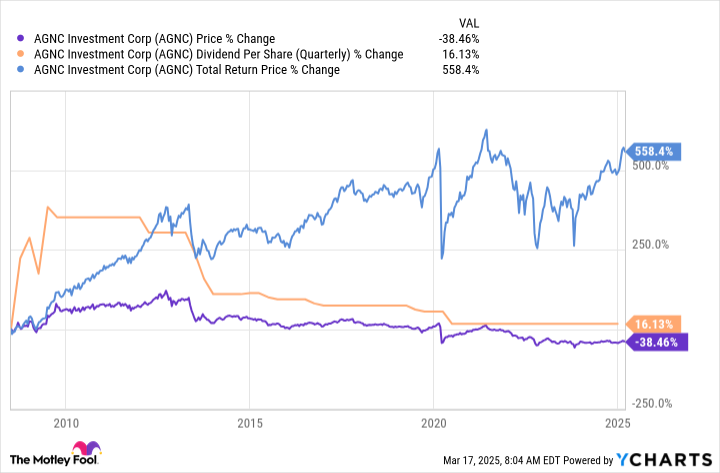AGNC Investment (AGNC 2.83%) is often viewed as a dividend stock, thanks to its huge dividend yield. Huge, however, is an understatement. The yield is an ultra-high 14% today. No wonder dividend investors are attracted to the mortgage real estate investment trust (REIT). The next year should probably bring more of the same on the dividend front, but is that your income timeframe?
What does AGNC Investment do?
Broadly speaking, there are two kinds of REITs. There are property-owning REITs, which, as implied, own physical properties. These types of REITs basically do the same thing you would do if you owned a rental property. The second kind of REIT is a mortgage REIT. This is what AGNC Investment is, and it's way more complex than owning and leasing out properties.

Image source: Getty Images.
AGNC Investment basically buys mortgages that have been pooled into bond-like securities. These securities trade all day long, unlike a property, and are affected by things like interest rates, housing market dynamics, and mortgage repayment rates, among other things. To add to the complexity, mortgage REITs generally try to enhance return with the use of leverage, or borrowing. That leverage is usually backed by the value of its portfolio of mortgage securities. This is not a business for the faint of heart.
In the case of AGNC Investment, it's also not a business focused on providing investors with reliable dividends. AGNC Investment describes its purpose as "generating favorable long-term stockholder returns with a substantial yield component." Thus the goal is total return, not income. Note that total return assumes the reinvestment of dividends.
NASDAQ: AGNC
Key Data Points
AGNC Investment achieves its goal
For the most part, AGNC Investment has done a good job of generating attractive total returns. Since its inception through the end of 2024, its total return averaged about 10% a year. It's hard to complain about that, given that 10% is the return that most investors expect from the broader stock market.
However, that yield is likely to be a siren call to dividend investors looking to live off the income their portfolios generate. This is where the story gets complicated. For the next year, it seems likely that AGNC Investment's monthly dividend will probably hold up. That's basically what has been going on since the dividend was cut in 2020. To put some numbers on that, the REIT paid out $1.44 per share in dividends in 2024 and generated $1.88 in net spread and dollar roll income per common share, which is basically like an adjusted earnings figure. That leads to a payout ratio of 77% or so. That's reasonable and suggests that the dividend is safe over the near term.
But what has the long-term picture looked like here for dividend investors? The answer is not so good, assuming you use your dividends to pay for living expenses. As the chart above shows, the dividend spiked after the company's initial public offering. The stock rose along with the dividend. Then the dividend was reduced, dragging the share price along with it. If you had been spending that dividend, you would have ended up with less income and less capital. Reinvesting the dividend, however, would have worked out pretty well for you, considering the total return line.
What is your goal?
If you have a short time horizon and are looking to generate a lot of dividend income, AGNC Investment could be a solid option during the next year or so. If you're focused on total return, history suggests it could be a solid investment over the long term. But if you are a long-term dividend investor seeking reliable income, it's hard to imagine how AGNC Investment would fit well in your portfolio for any extended length of time. It isn't a bad company, but it isn't a long-term income stock, and management is very open about that fact.





